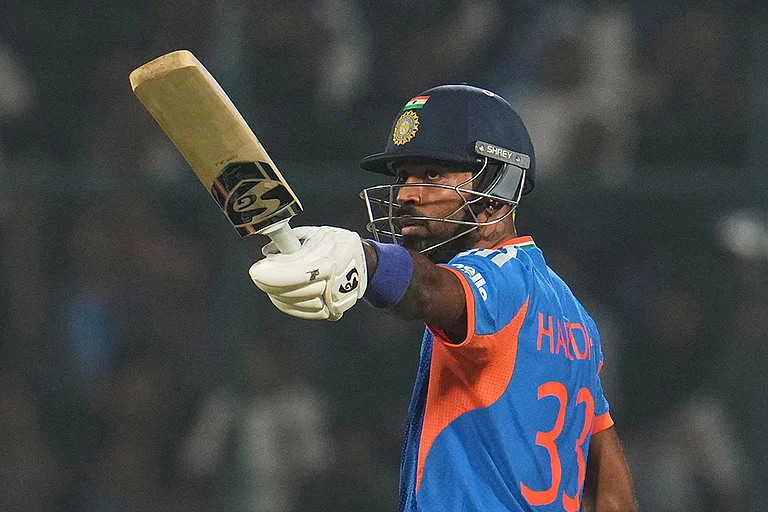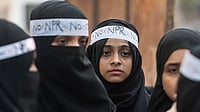Children of all age groups are scattered around the two-acre complex with its gaily painted walls. In their yellow T-shirts and blue sweatpants, they look like sunflowers blooming in that walled space. Some are playing, while some others sit under trees with their books and pencils jotting on their notebooks. The complex with its multi-coloured buildings is Snehawan, home to 60 children, all bound by their sad tales of personal loss–a parent who has died by suicide. They are all children of farmers from different parts of Maharashtra, from impoverished families, whose parents, predominantly fathers, chose suicide rather than see another debt-ridden day.
Snehawan, with its white and blue painted buildings—some with low roofing, three-storied, under construction and some built with large shipping containers—is a place that teaches children from the poorest of families that they too can have dreams.
Thirty-two-year old Ashok Deshmane, an IT professional who gave up his job to look after these children spent his childhood and teenage years in abject poverty. He convinced the next of kin to send the children to Snehawan, located 200 km away from Mumbai in Chakan in Khed taluka of Pune district.
Convincing the surviving parent, often a farmer’s widow whose relatives have a major say in the future of the children in households hit by suicide, is a challenging task. “When every child is a farm hand, the families are not too keen on educating them. They are poor and their biggest challenge is to get the next meal,” says Deshmane, whose work with these children has been applauded by many.

Since, 2015, when he took in the first lot of children and started looking after them in two rented 10x10 feet rooms in Bhosari–an industrial hub near Pune–he has come a long way. Snehawan is a happy place with its chatter and laughter. Deshmane and his 26-year-old wife Archana keep it so. He says his sole aim is to empower as many children as he can with the funds he has, with education and skills that will make them job creators instead of job seekers. “They are smart and show a willingness to learn. None of them will be farmers. They have their dreams and Snehawan is where they learn that dreams can be fulfilled. They may have come here in poverty but when they leave, they are richer in knowledge and experience like Vishal Shinde–a former student–who is now pursuing an MSc in Organic Agriculture at Hyderabad. And Shrikant Lamrud, who is completing a Bachelor’s of Computer Sciences degree at a private college.
In Jalna, Beed, Parbhani and Washim–the worst drought-hit districts in the Marathwada belt of Maharashtra–which have also witnessed high incidents of farmers suicides, children are an important part of the farm labour force, dropping out of schools to work in the fields–either theirs or that of someone else. “Education is the last priority in their lives. It is unaffordable even in the municipal schools where the fees are low. Our aim is to take them out of the stressful situation and give them the opportunity to study,” says Deshmane.
For many years, the facility was only open to boys. However, since last year, they have also started taking in girls. “When we saw that girls needed such a facility as much as the boys, we opened our doors to them,” he says.

Deshmane and Archana have been married for seven years. “I wanted a partner who would be a mother to all the children and live a life of austerity,” says Deshmane. “No girl was willing. Finally, Archana, the daughter of one of my uncles agreed. Since then, we live a single dream, to give these children a better life by empowering them with education.” says Deshmane. “We do not have much money, but what we have is shared with all our children. There is so much love here,” says Archana, who is pregnant with their second child. Their five-year old daughter Anandi too lives by the rules of Snehawan.
Deshmane does not believe that there must be shortcuts for education for the underprivileged. “People feel that the underprivileged do not want to study. They cannot because they do not have the money,” he says. His first brush with suicide was in 2015, when a farmer killed himself in Deshmane’s native village Magrul in Beed district. “There was no water for an 8 km radius and people were migrating as there was a severe drought in Marathwada. I kept thinking about supporting that family, but with my very limited means it just remained a thought until I met Prakash Amte (social worker) in Pune, in November 2015. I quit my job and started Snehawan with 18 children (all boys) housed in two rented 100 square feet rooms,” says Deshmane.
While the younger children at Snehawan study at a government-run school, the older ones are enrolled in a private school. Both schools are located some distance away from their facility. All students are dropped to school and picked up at varying times by the Snehawan school bus. Safety of the children is high priority, therefore, no one other than the working staff at the facility is allowed inside the gates. Thirty-seven CCTV cameras ensure the safety of the children.

Life in Snehawan begins at 6 a.m. By 6.30 a.m. they assemble in the common room for morning prayers. After a sumptuous breakfast, the younger children leave for school. Through the day, the place is buzzing with activity. Students studying in grades I to IV study in a government run school, while those in grades V to X go to a private school. From class XI on, they go to private colleges. This year two of their students–Sandeep Mangrulkar and Ganesh Bedre–scored 87 per cent and 86 per cent respectively in the State School Certificate (SSC) exam of the Maharashtra State Board.
Deshmane, an avid reader has ensured that there are books in every room across the complex–in the science lab, the living room, etc. There is a dedicated library with 2,000 books in English including poetry, fiction and non-fiction, housed in a large shipping container. This air-conditioned reading facility has been set up by a donor. “Our aim is to make them global citizens,” says Deshmane. “We have a tie-up with an organisation called AISEC, which sends us volunteers from foreign countries. Each volunteer stays for a minimum of three months. Alongside teaching them English, they also teach the children other subjects and life skills. Every child must read one book every week. We help the younger ones with their reading. We have a rule–one movie, one book. All those who finish reading their book for the week can watch the film that is shown every Sunday,” says Deshmane.
Before the start of the film, there is a group activity called Ringan (circle). The children and teachers sit in a circle and each one discusses the book they have read. The ones who do not read are taken to task and barred from watching the film.
“We are keen on teaching all the children driving and business skills. Our sponsors have given us machines for natural oil extraction, making potato chips, grinding pulses and spices and making papad. The focus is to develop a business mindset in the children and empower them with skills to make them job creators and not job seekers,” says Deshmane.
A dozen cows, housed in the gaushala within the complex, cater to the daily dairy needs of Snehawan. Bio gas is used for their kitchen needs. The entire place is powered by solar energy generated within the complex.
A mentee of renowned social worker late Sindhutai Sapkal, Deshmane is inspired by the philosophy of Swami Vivekanand and social reformer Baba Amte. In the living room of the low ceilinged cottage, which is a kind of viewing gallery for all the activities of Snehawan, large photographs of Swami Vivekanand and Baba Amte adorn the wall. Swami Vivekanand’s quote, “They alone live who live for others, the rest are more dead than alive,” beneath his framed photo is unmissable.


























